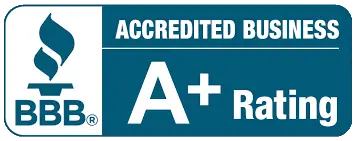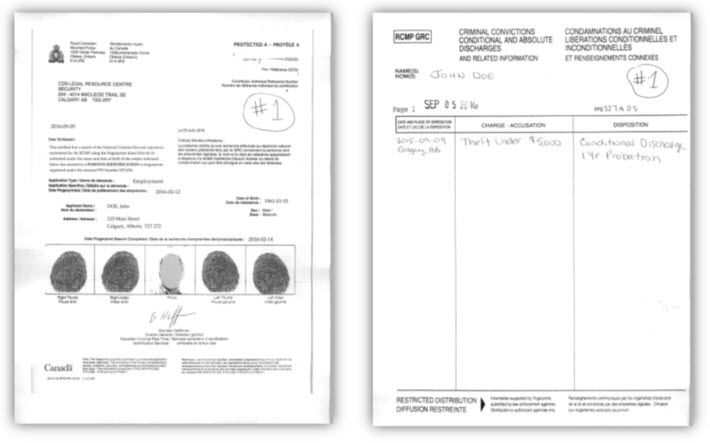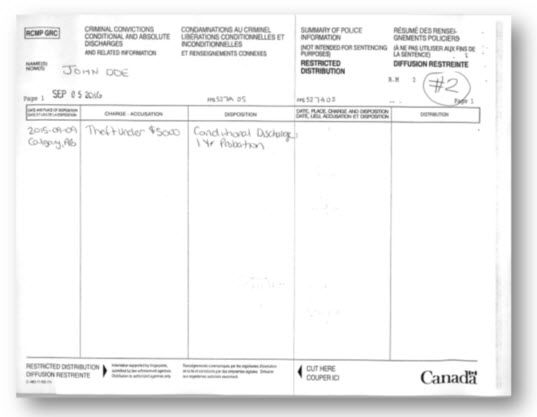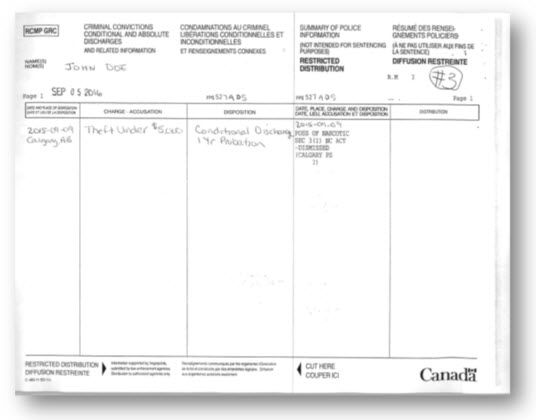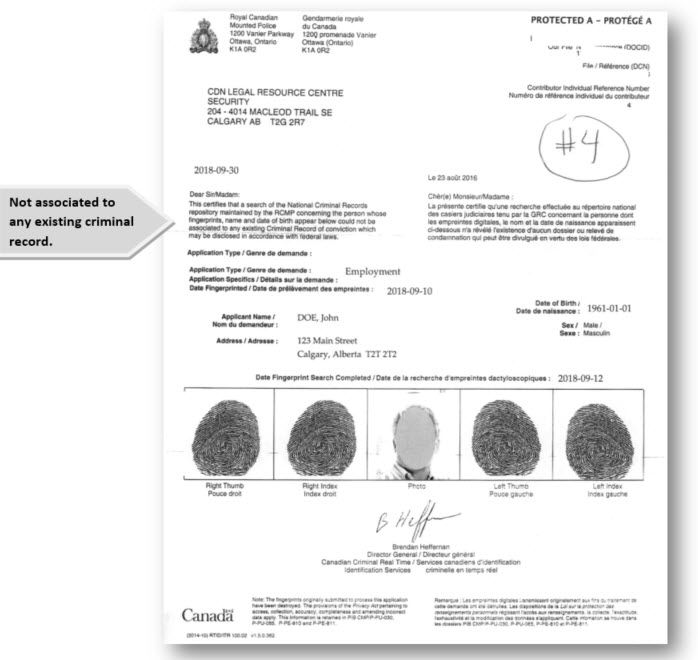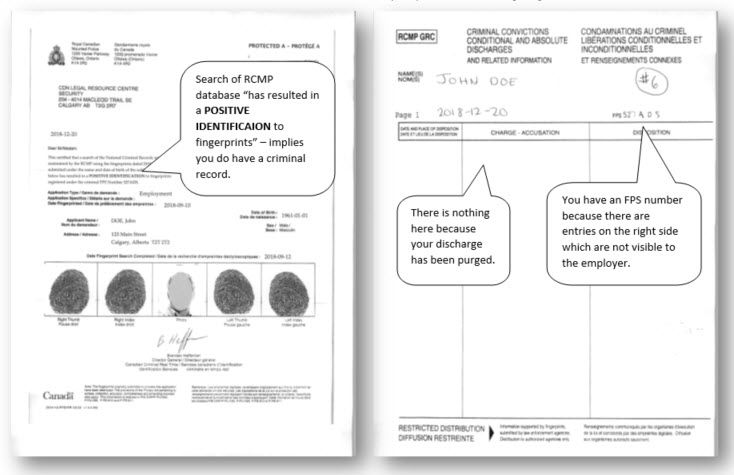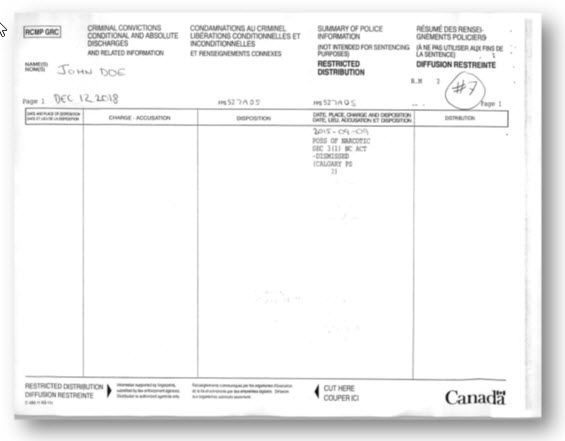Conditional and Absolute Discharges
Frequently Asked Questions and Answers
- What is a discharge?
- Is a discharge a conviction?
- Does a discharge result in a criminal record?
- What is the difference between an absolute and conditional discharge?
- How long do discharges stay on my criminal record?
- For conditional discharges, when does the 3 year waiting period begin?
- Is the discharge removed automatically from my criminal record?
- Why might the arresting police force or Judge at a Court House refuse to purge my discharge?
- What can go wrong with the purging of my discharge?
- What are the consequences of having a discharge?
- Will a discharge prevent me from gaining legal entry into the United States?
- What is a criminal record?
- Exactly where do conditional discharges get registered?
- Does my discharge automatically get purged by the arresting police force, court and RCMP?
- Under what circumstances can my discharge be revoked? disclosed?
- What does an RCMP Criminal Record Search look like?
- What other related information may appear on my RCMP criminal record background check?
- What should I do if I’ve been given a discharge?
- Six problems you will encounter if there are non-convictions entered on your RCMP criminal record, even though your discharge has been purged
- Will a discharge affect my ability to get employment?
- What if I am asked “Do you have a criminal conviction for which a pardon has not been granted?”
- What if I am asked “Do you have a criminal record for which a pardon has not been granted?”
- What is a vulnerable sector search?
- Will a discharge show up in a vulnerable sector search?
- Is a discharge better than a withdrawn charge?
- Excerpt from the Criminal Code of Canada
- Excerpt from the Criminal Records Act
- Absolute and Conditional Discharges Audit and Purge Services
What is a discharge?
There are two types of discharges: one is called an Absolute Discharge and the other is called a Conditional Discharge. Discharges are defined in this excerpt from the Criminal Code of Canada:
“730¬¬(1) Where an accused, other than an organization, pleads guilty to or is found guilty of an offence, other than an offence for which a minimum punishment is prescribed by law or an offence punishable by imprisonment for fourteen years or for life, the court before which the accused appears may, if it considers it to be in the best interests of the accused and not contrary to the public interest, instead of convicting the accused, by order direct that the accused be discharged absolutely or on the conditions prescribed in a probation order made under subsection 731(2).”
Is a discharge a conviction?
Though not a conviction, a discharge is still evidence of guilt because the accused “pleads guilty to or is found guilty of an offence” as outlined in the Criminal Code of Canada. It is also registered on the National Criminal Records Repository maintained by the RCMP often referred to as CPIC (Canadian Police Information Centre) until purged. CPIC is a central database which contains a variety of information including stolen vehicles, criminal records, wanted persons, stolen property and Firearms Registry.
Does a discharge result in a criminal record?
Yes, because a discharge is registered on the RCMP’s National Criminal Records Repository. Even though it is not a conviction, it remains on your criminal record until purged.
What is the difference between an absolute and conditional discharges?
If you were discharged on conditions prescribed, you were given a Conditional Discharge. Prescribed conditions in a probation order made under subsection 731(2) of the Criminal Code of Canada can include reporting to a probation officer, fine, restitution, volunteering, and targeted treatment (i.e. drug addictions and anger management courses). If no conditions are prescribed, then were given an absolute discharge.
How long do discharges stay on my criminal record?
An absolute discharge will appear on your criminal record for 1 year and conditional discharges will appear on your criminal record for 3 years. If you fail to meet the conditions, conditional discharges may be revoked and you could subsequently be convicted.
For conditional discharges, when does the 3 year waiting period begin?
The 3 year waiting period begins on the day of sentencing. Unlike Record Suspensions (previously called Pardons), you do NOT add the sentence (i.e. 6 months probation, 1 year suspended sentence, etc.) to the 3-year period.
Is the discharge removed automatically from my criminal record?
Discharges received on or before July 24, 1992 will only be removed from the RCMP’s National Criminal Records Repository upon written request to the RCMP after the 1 year waiting period for Absolute Discharges and after the 3 year waiting period for Conditional Discharges. Discharges received after July 24, 1992 are automatically removed after the 1 year waiting period for Absolute Discharges and after the 3 year waiting period for Conditional Discharges.
The discharge is not automatically purged from the records of the arresting police force after the prescribed waiting period. You must make a request in writing to the arresting police force to request a file destruction (police reports, photographs, fingerprints). They may refuse your request.
The courts will continue to maintain a record of the discharge in their court records even after it has been purged from the national RCMP database—though they are unlikely to disclose it to a third party without your consent. Court records may only be purged with a court order unless purged due to retention policy which varies from Province to Province.
Why might the arresting police force or Judge at a Court House refuse to purge my discharge?
The purge rules only pertain to the records held in the RCMP’s National Criminal Records Repository. The arresting police force and courts are not legal bound to comply with the purging of discharges. Their willingness to do so is only voluntary. However, the arresting police force and courts have strict rules on the disclosure of discharges.
What can go wrong with the purging of my discharge?
A discharge can incorrectly be recorded as a conviction. As a result, it will not be purged automatically.
Withdrawn, dismissed, stayed, and not guilty charges may also be registered on the RCMP’s National Criminal Records Repository and will not be automatically purged along with the discharge. As long as there are these types of entries on the national RCMP database you will continue to have an FPS number associated with your name—meaning you’ll continue to have a criminal record associated with your name (more on this later). FPS simply means “fingerprint section”.
What are the consequences of having a discharge?
- It is evidence of guilt and will still reflect negatively on your character until purged or for life if it is an excludable offence that makes you inadmissible to the United States.
- It appears on your RCMP criminal record for one year (if absolute) or three years (if conditional), following which it is either purged automatically or you have to request in writing to have it purged.
- If your discharge does not get purged automatically after one year (if absolute) or three years (if conditional), it will stay on your criminal record until you request in writing to have it removed (a process that can take the RCMP 8 to 12 months after request).
- If a discharge is disclosed to a Third Party, that Third Party may create a permanent life-time record of the offence (ie. you disclose it to a potential employer or the USA—they may retain a permanent record of your discharge).
- The discharge will show up on a criminal records check for employment, volunteering, adoption, etc. until such time as it has been purged.
- If you have other convictions for which you are applying for a Pardon (now called a Record Suspension), a Conditional or Absolute Discharge within the past 5 years (and sometimes longer) may result in the denial of your Record Suspension as there was an admission or finding of guilt.
- A discharge may prevent you from gaining legal entry into the United States if it is an excludable offence.
[TBS_ALERT color=”info” heading=”Have a question?”]Ensure your past will not jeopardize your future! Give us a call @ 403-229-2774 (Calgary) or 1-800-320-2477 (Toll Free)[/TBS_ALERT]
Will a discharge prevent me from gaining legal entry into the United States?
If the discharge is an excludable offence, you will need to apply for multiple U.S. Waivers of Inadmissibility over your lifetime for legal entry to the United States if you hope to visit the United States on a regular basis.
Waivers can cost thousands over your lifetime. If you need a Waiver for legal entry to the United States, it may not be granted until at least 5 years have passed since you were given the discharge.
Even though a discharge is not a conviction, because there was an admission or finding of guilt, the United States will treat it like a conviction and use it as a basis for determining permanent life-time inadmissibility which can only be overcome with temporary waivers.
What is a criminal record?
Conditional Discharges are not a ‘conviction’. But, they do result in a criminal record. Arguably, a criminal record is any information on file pertaining to a person that is related to a criminal charge which resulted in a conviction, stay of proceedings, was withdrawn or discharged, or which was dealt with by way of alternative measures—which may negatively reflect upon their character. For so long as there is any kind of information on a criminal record search which is associated with your name and date of birth, it by definition constitutes a type of criminal record even though no criminal conviction may have resulted.
Many people do not understand that by negotiating or accepting conditional discharges, it is the interpretation of the Criminal Code that there has been an admission or finding of guilt.
Exactly where do conditional discharges get registered?
The discharge is on record with:
- the arresting police force,
- court house (where you were sentenced); and
- on the RCMP’s National Criminal Records Repository.
Does my discharge automatically get purged by the arresting police force, court and RCMP?
The discharge will only get purged by the arresting police force upon written request after the required 1 or 3 year waiting period. However, the arresting police force may refuse to purge their local records pertaining to your discharge.
The discharge does not get purged from the court house at any time unless you obtain a Court Order from the Judge to purge the discharge, which may not be approved. Some courts do automatically purge court documents regardless of outcome after a prescribed period, which varies from Province to Province.
The discharge only gets purged from the national RCMP Criminal Records Repository(CPIC)
- upon written request if received on or before July 24, 1992, or
- automatically if received after July 24, 1992
- after the required 1 or 3 year waiting period. If the discharge was incorrectly registered, it may not get automatically purged following the prescribed period.
Under what circumstances can my discharge be revoked?
Your discharge may be revoked if you fail to meet the conditions or are convicted prior to the 1 or 3 year waiting period.
Under what circumstances can my discharge be disclosed?
A discharge may be disclosed in a background check if not yet purged from the national RCMP database.
A discharge may be disclosed by the arresting Police Force after it has been purged, in accordance with the Criminal Record Act, in exceptional circumstances and with prior approval from the Minister. For example, the arresting Police Force may disclose the fact that there was a discharge when the applicant applies for a Record Suspension, which may negatively impact the outcome of an application—it could be denied.
Also in accordance with the Criminal Records Act, conditional discharges may be disclosed if a person’s fingerprint is found at the scene of a crime or to identify a deceased individual or person with amnesia.
What does an RCMP Criminal Record Search look like?
A typical RCMP Criminal Record Search shows:
- convictions until a Record Suspension (previously called Pardon) has been granted;
- discharge(s) until they are purged; and
- other related information, if any (see #18 below).
What other related information may appear on my RCMP criminal record background check?
If you order an RCMP Criminal Record Search for the purposes of a Record Suspension, or if a non-certified RCMP Criminal Record Search is ordered, an additional column will appear.
This additional column may include, if any, charges that were withdrawn, dismissed, stayed or for which there was a finding of not guilty (including not guilty due to insanity).
Take a look at the sample RCMP Criminal Records on the pages that follow. We have demonstrated how criminal records look differently based upon the following information:
Criminal Records before the Discharge Has Been Purged:
- Discharges vs non related information
- Background Check for Employment vs Record Suspension
Criminal Records after the Discharge Has Been Purged:
- Discharges vs non related information
- Background Check for Employment vs Record Suspension
Background Check for Employment – Conditional Discharges (Example 1)
If only a conditional discharge is registered on the national RCMP database, a RCMP criminal record search ordered for employment purposes prior to the 3-year purge date would look something like this:
Background Check for Record Suspension – Conditional Discharges (Example 2)
But, if the same search were ordered for the purposes of a Record Suspension prior to the 3-year purge date, it would look like this (we’ve excluded the coversheet—it is identical to the coversheet in example 1 except that the application type would read: “Record Suspension”):
A person with just a discharge does NOT need a Record Suspension. But, if you want to see the left side and right side of a criminal record, ordering it for a “Record Suspension” will reveal both sides. In this case, the right side is blank.
Background Check for Record Suspension – Conditional Discharges and Withdrawn Charge (Example 3)
If the same search was ordered AND in addition to a discharge, withdrawn/dismissed and/or stayed charges were registered, it would look like this (we’ve excluded the coversheet—it is identical to the coversheet in the first example except that the application type would read “Record Suspension”):
Convictions and discharges appear on the left side. Non-convictions appear on the right side. As long as there are entries on the left and/or right side there will be an FPS number associated with your name.
Background Check – Discharge Purged, No Entries on Right Side (Example 4)
Here is what an RCMP Criminal Record Search looks like once the discharge has been purged and there are no entries on the right side (this is the only page you would receive—there is no second page):
A search for the purposes of a Record Suspension would reveal the exact same results because the discharge was purged AND there are no entries on the right side. This is exactly what you need to see to know that your entire file with the RCMP has been purged properly.
Employment vs Record Suspension Background Check – Discharge Purged, Entries on Right Side
What will an RCMP Criminal Record Search look like once the discharge has been purged and there are entries on the right side? aka a look here at this search for the purposes of “Employment”:
If you order a background check for employment, it will come back blank. This is confusing to your employer, as they will wonder “why is it blank” and “why is there an FPS number”. Even US authorities can access this information—they will speculate as to your police involvement.
This search was done for the purposes of a “Record Suspension” (the cover page would be identical to the one on the previous example, except that the Application Type would be for a “Record Suspension”:
NOTE: You can’t get a Record Suspension for a discharge. But, it is still okay to order this type of Search for a Record Suspension if you want to see the right side and have an understanding as to why there is an FPS number still associated with your name. The right column is not normally disclosed to employers or US Authorities.
What should I do if I’ve been given a discharge?
Following sentencing, it can take several months for a conviction or discharge to be registered on the national RCMP database. Once registered, you will have a criminal record until such time as your discharge (and charges withdrawn, dismissed, etc.) has been purged and convictions, if any, Pardoned/Suspended.
DIGITAL FINGERPRINTING
We recommend that you order a fingerprint-based criminal record background check for the purposes of a “Record Suspension” no earlier than 6 months after sentencing. You do NOT need a Record Suspension for discharges and charges that are withdrawn, dismissed, etc. We are only asking you to do a background check for the purposes of a Record Suspension so that we can see entries on the left and right side of your criminal record report.
How long does it take the RCMP to process a fingerprint-based criminal record background check?
- For people with no criminal record, approximately 1 to 2 weeks.
- For people with a criminal record (including discharges or entries on the right side), approximately 3 to 6 months.
If you apply too soon for a criminal record background check after sentencing, your discharge may not have been registered yet—meaning you’ll have to reorder your criminal record later. Therefore, do not order a fingerprint-based background check until at least 6 months after sentencing.
If given an Absolute Discharge, it is possible that if you wait 8 months to order your RCMP criminal record and it then takes the RCMP 4 months to issue your report, the Absolute Discharge could already have been registered and later purged if one year has already past. However, if there entries on the right side, they will still show up.
Therefore, it is still worthwhile to order a fingerprint-based background check for Absolute Discharges.
COURT HOUSE
Immediately upon sentencing, we recommend you order a certified copy of your Information and Endorsements showing the outcome of all charge(s) (ie. discharged, withdrawn, dismissed, etc). The courts may be able to do this within a few days of sentencing, but if you wait to order the court documents they could be sent to storage—which means it could take longer to order them later. The reason you want to order them early is so that you have them on hand when your RCMP criminal record check has been received so that you can verify the discharge has been properly registered. ALSO, the court documents may help us in determining whether or not you need a US Waiver for legal entry to the United States.
Once you get your RCMP background check:
- Ensure that your discharge was recorded correctly (ie. it should state it is a discharge). If recorded incorrectly, send a copy of your RCMP criminal record and court documents to the RCMP and request that they correct your RCMP criminal record (which typically takes upwards of 8 months). If you are not sure if this is necessary, contact us for a consultation on this matter.
- Look to see if there are entries on the right side.
- (e) If there are no entries on the right side, then you can be almost 100% sure the discharge will be purged automatically after one year if absolute and after three years if conditional provided the discharge was given after July 24, 1992. Otherwise, you’ll have to request in writing to have your discharge purged. When the one or three years are up, we recommend that you complete a background check to ensure that it has in fact been purged properly.
If there are entries on the right, take the report to the arresting police force approximately 8 months in advance of the scheduled purge and ask them to instruct the RCMP to purge the entries on the right side. They will either help early (knowing that it could take the RCMP 8 to 12 months to purge it), or make you wait until the discharge has been purged. It does not hurt to ask early.
[TBS_ALERT color=”info” heading=”Have a question?”]Ensure your past will not jeopardize your future! Give us a call @ 403-229-2774 (Calgary) or 1-800-320-2477 (Toll Free)[/TBS_ALERT]
Six problems you will encounter if there are non-convictions entered on your RCMP criminal record, even though your discharge has been purged:
- If you get a 48 Hour Criminal Record Search based upon a search of your name and date of birth, the search will indicate “there may be a criminal record”. To determine whether or not a criminal records search exists, the applicant will have to submit fingerprints for processing by the RCMP—which is currently taking 4 to 6 months. This is TOO long if an employer is looking to hire right away!
- Your RCMP Criminal Record Background Check will disclose a “Police File” (ie. left side of the report) only it will be blank! A police file number (FPS) will be associated with your name, date of birth and fingerprints—causing the employer to wonder why there is an FPS number but no convictions. Typically, withdrawn or dismissed charges are not disclosed to Third Parties but there is still a police file.
- You have to make a request to your local police to have the non-convictions and FPS number associated with your name purged—a process that can take upwards of 8 to 12 months.
- You might be able to request the arresting police force to purge the non-convictions well in advance of your discharge being purged, but the arresting police force will likely wait until the discharge has been purged first.
- The police may refuse to purge local records of a discharge.
- To summarize, if the discharge has been purged and there are entries on the right side of your criminal record, it can take 4-6 months to obtain a certified criminal record background check (too long for most employers), and most employers will be confused as to why there is a police file listed next to your name but no convictions.
Will a discharge affect my ability to get employment?
A discharge will show up on criminal record background checks until such time as they have been purged.
Even if purged from the national RCMP database, the local police may disclose the fact that a discharge existed. Though they are unlikely to disclose a discharge, they may in some exceptional circumstances (ie. job involving the vulnerable sector).
What if I am asked “Do you have a criminal conviction for which a pardon has not been granted?”
The answer is “no”. Technically, you do not have a conviction. But, a discharge will appear on your criminal record until purged. Most employers will not understand that a discharge is not a conviction as it will appear on your criminal record. They will think that it is a conviction and that you’ve just lied to them. It will still reflect negatively upon your character.
The truthful answer would be “No, I do not have a criminal conviction. However, I do have a conditional discharge which will appear on my criminal record for a period of 3 years.”
What if I am asked “Do you have a criminal record for which a pardon has not been granted?”
The answer is “yes”. Technically, if your discharge has not yet been purged or if purged but there are entries on the right side, it would appear you do “have a criminal record” but you do not have “convictions”. This is very confusing to most employers.
What is a vulnerable sector search?
A vulnerable sector search is done for persons wishing to volunteer or work in the vulnerable sector which involves children, ill people, disabled people, elderly people or displaced people (i.e. women’s or homeless shelters). This type of search may also be done for people wishing to adopt.
Will a discharge show up in a vulnerable sector search?
(a) A discharge will show up in a vulnerable sector search if not purged.
(b) If purged from the national RCMP database, a discharge may still show up in a vulnerable sector search if the local police determine it to be relevant to the position being sought (in which case they will release information found in their local files unless you previously succeeded in having them destroy your entire file).
Is a discharge better than a withdrawn charge?
On the surface a withdrawn charge is better – but at what expense? If not automatically given and you have to go to trial, for example, to plead innocence—you have to assess the risk that you could be found guilty. There can be incredible expenses to go to trial.
If found guilty you have to apply to have your record sealed 5 years after completion of your sentence if the offence was tried summarily or 10 years after completion of sentence if your offence was tried by indictment.
If found guilty, there is a higher risk the crown will proceed by indictment (at least based upon my observation—that is the impression I have been given).
This means, through plea bargaining, you can agree to a discharge or go to trial at great expense/considerable risk and hope that you succeed in having your charge withdrawn.
If convicted, you may have to wait 5 or 10 years after the completion of your sentence to apply for a Record Suspension—which typically can cost $1,000 or more and take 1 to 2 years after eligibility to be approved. This means, at the earliest, it could take 6 to 12 years after the completion of your sentence for your criminal record to be sealed (suspended)!
Excerpt from the Criminal Code of Canada:
Conditional and absolute discharge
730 (1) Where an accused, other than a corporation, pleads guilty to or is found guilty of an offence, other than an offence for which a minimum punishment is prescribed by law or an offence punishable by imprisonment for fourteen years or for life, the court before which the accused appears may, if it considers it to be in the best interests of the accused and not contrary to the public interest, instead of convicting the accused, by order direct that the accused be discharged absolutely or on the conditions prescribed in a probation order made under subsection 731(2).
Period for which appearance notice, etc., continues in force
(2) Subject to Part XVI, where an accused who has not been taken into custody or who has been released from custody under or by virtue of any provision of Part XVI pleads guilty of or is found guilty of an offence but is not convicted, the appearance notice, promise to appear, summons, undertaking or recognizance issued to or given or entered into by the accused continues in force, subject to its terms, until a disposition in respect of the accused is made under subsection (1) unless, at the time the accused pleads guilty or is found guilty, the court, judge or justice orders that the accused be taken into custody pending such a disposition.
Effect of discharge
(3) Where a court directs under subsection (1) that an offender be discharged of an offence, the offender shall be deemed not to have been convicted of the offence except that
(a) the offender may appeal from the determination of guilt as if it were a conviction in respect of the offence;
(b) the Attorney General and, in the case of summary conviction proceedings, the informant or the informant’s agent may appeal from the decision of the court not to convict the offender of the offence as if that decision were a judgment or verdict of acquittal of the offence or a dismissal of the information against the offender; and
(c) the offender may plead autrefois convict in respect of any subsequent charge relating to the offence.
Where person bound by probation order convicted of offence
(4) Where an offender who is bound by the conditions of a probation order made at a time when the offender was directed to be discharged under this section is convicted of an offence, including an offence under section 733.1, the court that made the probation order may, in addition to or in lieu of exercising its authority under subsection 732.2(5), at any time when it may take action under that subsection, revoke the discharge, convict the offender of the offence to which the discharge relates and impose any sentence that could have been imposed if the offender had been convicted at the time of discharge, and no appeal lies from a conviction under this subsection where an appeal was taken from the order directing that the offender be discharged.
R.S., 1985, c. C-46, s. 730; 1995, c. 22, s. 6; 1997, c. 18, s. 141.
Excerpt from the Criminal Records Act:
Discharges
6.1 (1) No record of a discharge under section 730 of the Criminal Code that is in the custody of the Commissioner or of any department or agency of the Government of Canada shall be disclosed to any person, nor shall the existence of the record or the fact of the discharge be disclosed to any person, without the prior approval of the Minister, if
(a) more than one year has elapsed since the offender was discharged absolutely; or
(b) more than three years have elapsed since the offender was discharged on the conditions prescribed in a probation order.
Absolute and Conditional Discharge Audit and Purge Services:
We can assist you with the following:
Ensure your discharge is purged properly on the RCMP Database
Purging of related information on the RCMP Database
Request for destruction of entire file with arresting Police Force (reports, photographs and fingerprints)
Ordering of local court documents
United States Inadmissibility Review (we will assess your case and let you know if you need a USA Waiver for Legal Entry to the United States, provide you with a letter confirming your admissibility or let you know if it is recommended you see a Non-Inadmissibility Letter from the Department of Homeland Security for situations in the ‘grey’ area)
Peace of Mind!
What does it cost for these services?
Our fee is $195+disbursements + GST
What are disbursements? Disbursements vary across Canada.
Local Fingerprinting Fees (around $75+GST/PST)
Court House Fees ($0.00 to $20 GST/PST)
Arresting Police Force purge services fee ($0 to $75 + GST/PST)
[TBS_ALERT color=”info” heading=”Have a question?”]Ensure your past will not jeopardize your future! Give us a call @ 403-229-2774 (Calgary) or 1-800-320-2477 (Toll Free)[/TBS_ALERT]


